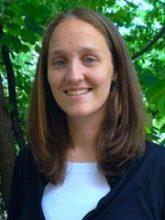
You can learn a lot about someone in just five minutes, and first impressions can leave a lasting impact. Sometimes, it only takes five minutes to learn something new, connect over shared interests, or change a person’s mind. It’s just enough time to leave an indelible mark that can last a lifetime.
Today, we sat down with Marta Hatzell, assistant professor of mechanical engineering, for five minutes to see what we could discover.
Water purification is one of today’s greatest healthcare crises, and rightly so—more than 800 million people around the world don’t have access to safe drinking water. There are dozens of ways that one can go about producing clean water, from desalination to chlorination, and everyone has an opinion on which is best.
Marta Hatzell, assistant professor in the Woodruff School of Mechanical Engineering, has her own theory: using electrochemistry might just be the perfect solution. Electrochemistry is the study of chemical processes that cause electrons to move. Through recovery of low-grade waste heat, Hatzell hopes to discover new thermodynamic cycles that will utilize the heat generated by electricity, as well as the electrical charges of molecules in unclean water to desalinate and clean it.
Even beyond purifying water, Hatzell believes that with further development, electrochemical technologies will be able to perform tasks that are currently completed through thermal processes, such as creating fuels. Her research team in the WATER Lab deals with purifying water, as well as creating a specific type of fuel: fertilizer, which fuels plants and therefore the rest of the organisms on Earth. The development of a more environmentally-conscious method of fertilizer production could decrease greenhouse gas emission and encourage sustainable agriculture.
“The price of electricity is decreasing, so we can now easily access it, and we want to figure out if there are better and more creative ways to use those electrons than just sending them to our homes,” said Hatzell. “Can we make fertilizer from electricity? Can we clean water using electricity?”
Hatzell says that she has always been fascinated with sustainability and energy. She fell in love with electrochemistry as an undergraduate researcher at Pennsylvania State University and throughout her journey has altered her focus as her interests within the field of electrochemistry have shifted.
“I wanted to do a Ph.D. focused on water because I thought that water is always going to be a large issue no matter where you are or who you are,” said Hatzell. “First I worked on fuel cells for fuel cell vehicles, and then transitioned to water treatment. Now we're going toward fertilizer production.”
Hatzell has only been on Georgia Tech’s faculty since 2015. Since then, she has managed to get her own lab up and running, and she even has a grant from the National Science Foundation backing her research. This money supports research to investigate low cost decentralized water treatment as a substitute for a large central water treatment plant in communities.
A decentralized water treatment system would help immensely in situations such as the one that has been afflicting Puerto Rico and other Caribbean islands in the wake of recent hurricanes. Since power outages have impeded the ability to clean and pump water to wherever it is needed, a decentralized system might provide a steady source of clean water in a situation where a central treatment center might have failed or been destroyed.
“We want to offer people decentralized water treatment that is easily powered with a battery device,” said Hatzell. “When power shortages occur, the community would be able to use backup power to clean water.”
Hatzell’s work has the potential to impact people all over the world. But she’s also making an impact closer to home through the classroom by empowering her students. Hatzell takes great satisfaction from teaching thermodynamics and electrochemical energy classes to a variety of engineering students.
“The defining moment is when I start to see students take ownership of the classroom,” said Hatzell. “When I can see it become more of a collaborative learning environment, that’s when I start to feel like teaching has really hit its stride.”
The coming years are sure to bring more effective solutions for clean water and fertilizer production, and Hatzell plans to be on the front lines of the research that will make it a reality.